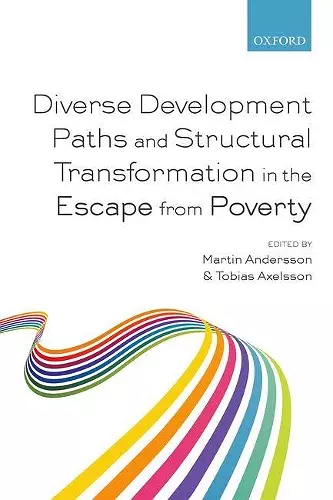Diverse Development Paths and Structural Transformation in the Escape from Poverty
Martin Andersson editor Tobias Axelsson editor
Format:Paperback
Publisher:Oxford University Press
Published:3rd Aug '17
Currently unavailable, and unfortunately no date known when it will be back
This paperback is available in another edition too:
- Hardback£107.50(9780198737407)

This volume analyzes the experiences of developing countries in Asia, Latin America, and Sub-Saharan Africa, and examines how they might catch up. Based on growth performance across the developing world over the last five decades, it offers a thorough account of the possibilities to engage in such processes in an increasingly globalized world. Together, the chapters highlight the diversity and variation of development pathways and provide valuable lessons and implications for how to approach this difficult question. The book shows the importance of acknowledging that the process of development is dynamic and that the possibilities for catch up are situation dependent. At the same time it makes clear that without structural change, and in particular agricultural transformation, sustained catch up is unlikely to happen. The volume demonstrates how analysis of current growth processes in developing countries can be enriched by paying closer attention to the multifaceted nature of both economic backwardness and successful pathways to escape it.
Convergence, structural change, institutions, capabilities such keywords form the skeleton of contemporary development theory. This fascinating book adds concrete, historical flesh to the concepts. It demonstrates the diversity of development paths and provides hope of continued economic advancement, even if under different models than have prevailed to date. * Dani Rodrik, Ford Foundation Professor of International Political Economy, Harvard Kennedy School *
This excellent volume brings together leading scholars with interests in long term economic dynamics in the borderland between economic history and development economics to provide a thought-provoking overview of the patterns of economic development and an agenda for policy. It will be valuable to policy-makers and academics alike. * Stephen Broadberry, Professorial Fellow and a Professor of Economic History, Nuffield College, Oxford University *
One of the most intellectually exciting areas of social science is the fusion of economic history and economic development. This important book brings some of the main practitioners of this revolution together to reflect on the progress made. * James A. Robinson, University Professor, University of Chicago, Harris School of Public Policy *
Structural transformation of agrarian economies has been recognised as essential to escaping poverty. It is one of the few generalisations that development economists can confidently make! Perhaps because of this, policy analysts have been overly prescriptive and dogmatic about the path a given country should take, holding up miracle cases as universal models. The great feature of this book is to highlight the context-dependence, diversity, and dynamism of development pathways. Bringing the insights of leading economic historians to the practical issues of agricultural and industrial development, this collection examines the contingency of the transformation process across three continents. The result is a deeply insightful contribution to both economic history and development policy. * Rob Cramb, Professor of Agricultural Development, University of Queensland *
The book, written by experts on the subject, will be of great interest to researchers of development economics and to economic historians; there are even chapters that can be of interest to a less specialized public, because they treat these topics in a rigorous but clear and simple way. * Gloria Quiroga, Economic History Review *
ISBN: 9780198803706
Dimensions: 233mm x 155mm x 17mm
Weight: 460g
302 pages